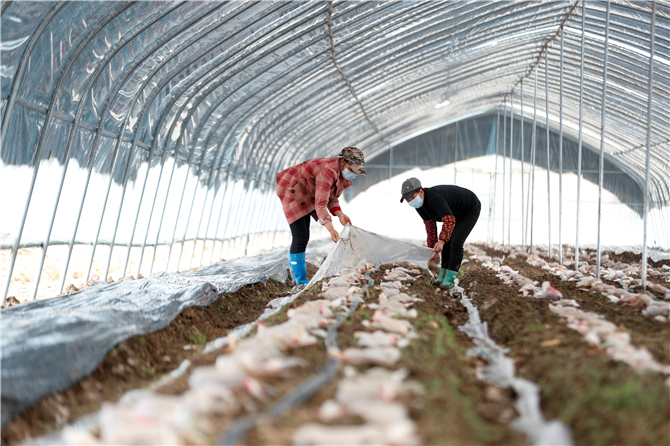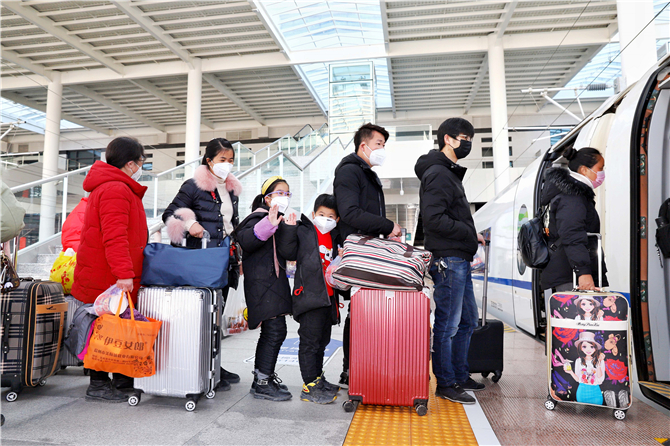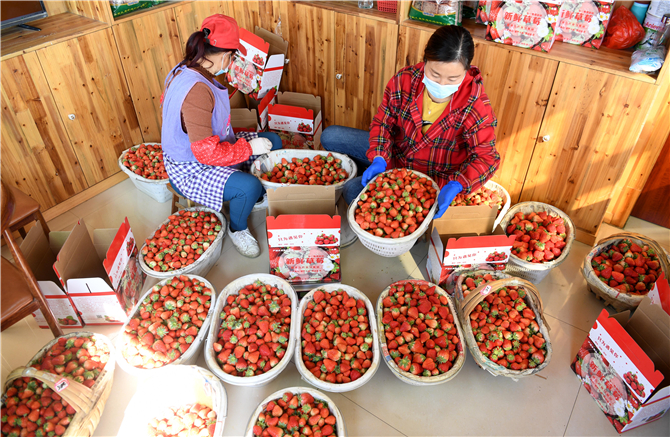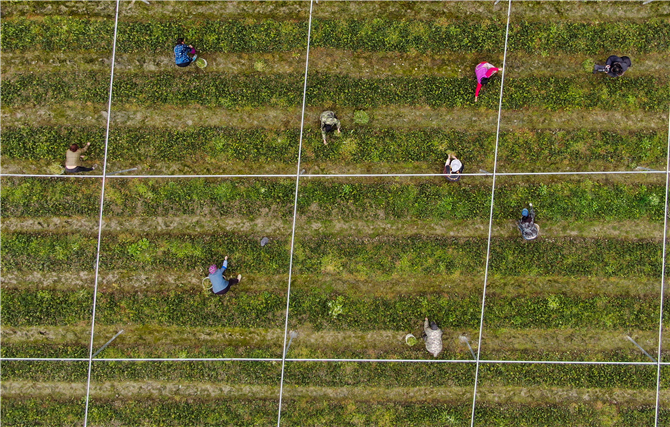China moves to mitigate impact of epidemic on poverty alleviation
Amid the coronavirus outbreak that has spread throughout China, the scene of over 200 mask-wearing farmers working on the tea plantation offers reassurance for villager Liao Boxuan.
"I didn't expect that work on the tea plantation would resume so soon," said the 42-year-old tea farmer in a mountainous village in southwest China's Chongqing Municipality, not far from Hubei Province that is hit hard by the virus.
With a handicapped husband to care for and most of her family's income coming from tea growing, Liao had been worried that the outbreak would affect the livelihood of her family, causing it to slide back into poverty.
"Villagers are working on the tree plantation separately to avoid the risk of infection," said Wang Dong, a Party official of the village. "Before the epidemic is over, all the work will be done in this manner."

Farmers work at a mushroom greenhouse in southwest China's Chongqing Municipality, Feb. 22, 2020. (Photo by Huang Wei/Xinhua)
In many parts of China, the wide-spreading epidemic has hindered the flow of the workforce, disrupted the operations of industries and postponed anti-poverty projects, posing new challenges to China's campaign to eradicate absolute poverty in 2020.
By the end of last year, there were still nine provincial regions that each had over 100,000 people living under the poverty line.
In response to the challenges in poverty alleviation, Chinese authorities have rolled out measures to secure employment of the poor population amid the outbreak.
Local authorities should provide targeted employment assistance to stop people from returning to poverty due to the epidemic, said a circular issued by the Ministry of Human Resources and Social Security and the State Council Leading Group Office of Poverty Alleviation and Development.
Migrant workers will be organized to return to work in a safe and orderly manner, while companies, poverty alleviation workshops and farmland irrigation projects should resume operation at the earliest possible date in regions less affected by the epidemic, according to the circular.
Allowances will be granted to key enterprises giving preference to qualified poor workers in recruitment and subsidies will be offered to poor laborers taking temporary posts related to epidemic control.

Workers returning to their jobs board the special train G9383 from Fuyang to Ningbo, Zhejiang, with their families at Fuyang West Railway Station in Fuyang, east China's Anhui Province, Feb. 18, 2020. (Photo by Zhou Wei/Xinhua)
In the city of Fuyang in east China's Anhui Province, local authorities have provided exclusive high-speed railway service to guarantee the safe return of migrant workers after the extended Spring Festival holiday.
As a major labor exporter, Fuyang, with a total population of over 10 million, exports over 2 million migrant workers to the Yangtze River Delta, the Pearl River Delta and other relatively developed regions in China.
"I thought I had to stay at home for another two months before returning to work. No work means no money. I was very worried," said 50-year-old migrant worker Li Xuechen on a train bound for the coastal city of Ningbo.
"The government is very considerate in transporting us back to workplaces free of charge."
"I can make 4,000 yuan (about 571 U.S. dollars) a month in Ningbo. The earlier I start working, the earlier I get paid," said Li, a resident in Fuyang who has to provide for his ailing wife and two children in college.

Farmers pull out the weeds in a tea-oil tree plantation in Youyang County, southwest China's Chongqing Municipality, Feb. 25, 2020. (Xinhua/Liu Chan)
Hengyi, a manufacturer of resin-based handicrafts in Anhui, is an enterprise that offers preferential employment policies for the poor population. About 80 percent of its products were exported to the United States, Turkey, Russia and other countries.
To provide jobs for the poor as early as possible, the company resumed operation a week ago. Twelve workers, including three poverty-stricken ones, resumed work.
"I was idling at home and worried about my income when the good news came that the factory had resumed operation," said 48-year-old worker Lyu Gang, who was busy making handicrafts with a mask on.
Four years ago, Lyu came to work in the factory. With his hard work and the policy support of the government, the family gradually escaped poverty.
"I make an average monthly salary of over 3,000 yuan. My wife also works here and can make over 2,000 yuan," Lyu said.

Farmers pull out the weeds in a tea-oil tree plantation in Youyang County, southwest China's Chongqing Municipality, Feb. 25, 2020. (Xinhua/Liu Chan)
At a tea-oil tree plantation in Youyang County in Chongqing, villager Chen Changhui has found a temporary weeding job that can make her 70 yuan a day.
Before the outbreak, Chen and her husband worked in an auto parts company in the coastal city of Xiamen. With two elderly people and four children to support, life was particularly hard for the family.
Due to the delayed opening of schools, Chen had to stay at home to take care of the children and could not go to Xiamen for the time being.
"Staying at home without income, I had been very worried about the livelihood of the family," said Chen. "Now, with the temporary job offered by the local government, I can take care of my family while working. I am relieved."
Editor: John Li